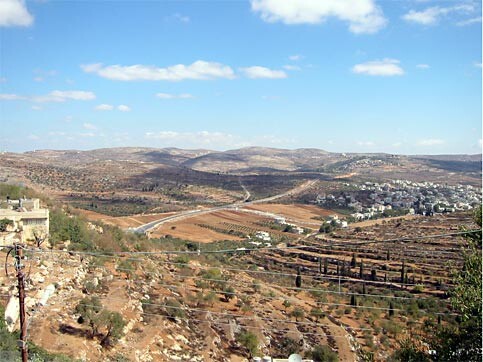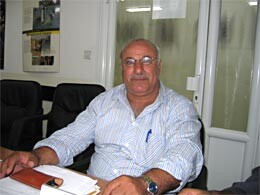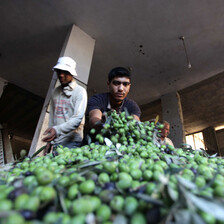The Electronic Intifada 26 November 2005

A Palestinian woman is forcebly removed from her land by Israeli forces, near the village of Beit Duqqu, Northwest of Jerusalem, in 2003. (Photo: MA’AN)
For a week in early November the groves in the West Bank village of Singel rain olives. Tarps carpet the turf underneath sagging olive branches while empty sacks are piled nearby, soon to be anchored by upwards of sixty kilos of olives.
Thanks to the marathon days of olive picking by mothers, fathers, and children - farming families, the sacks sit swollen by day’s end. At least two villagers are needed to hoist these colossal bags out from under the trees.
If you arrive a day after the olive harvest in the Palestinian village of Singel, you can count on finding full burlap sacks, thigh high. The groves of century-old trees will soon be left behind though, as arrangements have been made for shipments to local markets for sale and a nearby factory for olive oil production.
When the olives ripen, families and neighbors retreat from their homes to clear the limbs, a tradition dating back many centuries. Unlike the anticipation surrounding many holidays, this harvest bears an even greater expectancy as olive trees often stand dormant on alternate years. It is those years of blossom which never seem to come quickly enough as families rely on harvest earnings to meet many of their most basic needs.
Unless the settlers and their IOF (Israeli Occupation Forces) keepers pay them an uninvited visit.
Palestinian farmers know this drill all too well.

A view from Singel. (Photo: “Oscar Randolph”)
The rolling fields of Singel blanket several hills, skirting roughly 2 kilometers around the bakery, butcher and elementary school in town. Beyond these hilltops, upon which lie corridors of olive, fig, and almond trees, exists a series of Israeli settlements fortified by a nearby IOF Military Base. Judging from their sprawling growth over the past few years, these surrounding settlements appear to be quickly closing in on Singel. Or maybe Singel is just getting smaller.
Regrettably, nobody’s eyes are playing tricks on them. Settlement growth and the diminishing size of Singel are intrinsically related. Singel’s families continue to brace themselves in the face of unchecked land grabs awarded to newly created Israeli settlements. While Israeli tax collectors are quick to furnish documentation that links Palestinians to their land for taxation purposes, they are quicker to dismiss these records when issuing evacuation orders. Rarely do Israeli authorities balk at this double standard with regard to settlement expansion.
Actual removal of Palestinians from the land has proven difficult, though. Brute force is often needed to uproot Singel’s families from their fields. Yet, as of late, and much to the contempt of Israeli officials, local Palestinian resistance has emerged in the form of LDCs (Land Defense Committees).

Grapevines in Singel cut down by settlers from Maale Levona settlement. (Photo: “Oscar Randolph”)
As of late, LDCs have proven the best hope to trump threats to Palestinian land and livelihood. In September 2003, the Norwegian People’s Aid provided funding for MA’AN Development Center to launch a three year “Right to My Land” project, giving teeth to the committees’ cause by developing their organizational and advocacy capacities. Their efforts in 82 West Bank and Gaza communities are now seminal in helping landowners comply with policies chiefly intended to stack the deck against Palestinians.
Concerted campaigns by Israel, both through checkpoint and chain, have been highly successful in rendering vast amounts of Palestinian land inaccessible. The Israeli government continues to sink thousands of dollars into a media campaign which coins what many have labeled “The Apartheid Wall”, as nothing more than a “Separation Barrier”. To their credit they have accurately described a wall which is doing just that; separating Palestinian farmers from their land.
Since the 650 kilometers of barrier construction began, the amount of Palestinian property in front of and behind the wall has been considerably reduced. Much of what remains has become “disputed land” due to farmers’ struggles to find the needed capital to plow their lands. If a plot is found uncultivated, its landowner loses any claim he once had to that soil. Rarely can this discovery be ascribed to derelict landownership, although the IOF will insist these parcels are simply being neglected. This makes about as much sense as declaring a mother unfit to parent when her child catches pneumonia on the school playground after the class bully swipes the coat off of her daughter’s back.
In Singel, along with many other Palestinian townships, farmers must also contend with chronic settler raids that hijack harvests, torch vines and blossoming crops, and slash rows of trees spanning several dunums. They find themselves routinely threatened by armed settlers, whose’ vigilantism has become the issue, not the oddity.
Through no fault of their own, farmers often come up short when stretching scant resources to plow gaping land. Looting turns many upcoming harvests into unknowns. In turn, saving enough income for tilling next year’s crops becomes, at best, questionable. Singel is certainly familiar with this misfortune. Its fertile land is now coveted by Israelis for its proximity to existing settlements while settler aggression has turned many a day in the field into a harrowing outing for Singel’s villagers.

Fathi, a 53 year old farmer from Singel, at MA’AN’s Training in Media course in October 2005. (Photo: “Oscar Randolph”)
Singel’s LDC realizes funds for plowing will not last forever, as does Fathi. This is why he joined the committee, to help them in their search for additional funding opportunities. LDCs across the region have begun networking with one another, strategizing to increase their visibility and paralegal services, while publicly exposing the injustice occurring at the hands of the Israeli government and many of their unruly settlers. The committees fully realize they have a cause that donors and other civil society groups will stand behind. Fathi understands that this will not happen unless international groups are well-informed. He and many other LDC members are not waiting around for others to tell their story. They recently completed a Training in Media course to amplify their voices and turn the LDC network into an opposition group not to be reckoned with.
As Israeli land confiscation continues unabated in many villages and settlers treat Palestinian land as nothing more than a frontier for conquest, it is all the more critical that Land Defense Committees strengthen their partnerships. Likewise, international aid groups need to underscore this movement by pledging their commitment. Although land security is an entitlement, it remains unfulfilled for many Palestinian villagers, forced to live next to settlers who are far from neighborly and “neighbors” who are, clearly, unsettling. Moreover, as LDC membership growth so expressively reveals, it is a belief that Palestinians prefer asserting through institutional backlash. Indeed, they will to turn to one another.
“Oscar Randolph” is the psydonym of a 26-year-old American who came to Ramallah in the summer of 2005. He is a media officer at the MA’AN Development Center, a local Palestinian NGO, where he documents their various projects promoting community development, capacity building, food security, and environmental justice.

